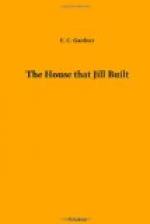First—Those who contemplate, at some time, the building of a home. It matters not whether it is to be humble or palatial, “The House that Jill Built” will be found to contain not only the most valuable suggestions, but a humorous gaiety that will be sure to add pleasure to this duty.
Second—Those who desire at any time to enlarge, modify or improve the homes in which they live; for they will find very forcibly illustrated in its pages the principles which should govern such modification.
Third—Those who, like the writer hereof, have suffered in purse and comfort from the lack of such a pleasant and philosophical treatise, and who will be glad to see how their blunders might have been avoided.
“The House that Jill Built” is founded on the rock of common sense. It does not profess to tell the prospective builder how to be his own architect and carpenter; it does not fit him out with a plan ready made and tested—by somebody else: but deftly and easily it leads him to think about the essential elements of the home he desires until, almost unconsciously, he finds himself prepared to give such directions to an honest architect as will secure for his home, convenience, safety and that peculiar fitness which is the chief element of beauty in domestic architecture. It is not so much for what is taught as for what is suggested that the book is valuable. What the author has written is perhaps not more remarkable than the peculiar art with which he compels the reader to think for himself. “The House that Jill Built” may fairly be said to take the first place among the many works that are designed to make our domestic architecture what it ought to be—the art by which the house-builder may erect a home adapted to his needs, commensurate with his means, in harmony with its surroundings and conducive to the health and comfort of its occupants. What the author’s pen has so well described his pencil has illustrated with equal happiness.
In penance for the lack of faith displayed at the outset and in hearty approval of the pages that follow, the Editor has written these words.
A.W.
TOURGEE.
Philadelphia, Oct., 1882.
THE HOUSE THAT JILL BUILT.
CHAPTER I.
A wise father and A glad Son-in-law.
Among the wedding-presents was a small white envelope containing two smaller slips of paper. On one of these, which was folded around the other, was written,
“A new house, from father.”




